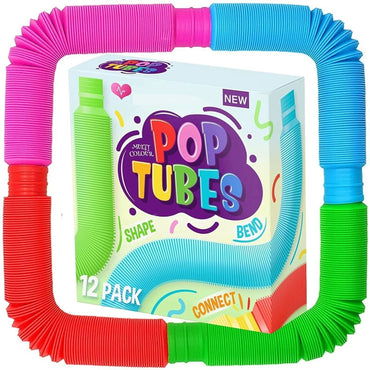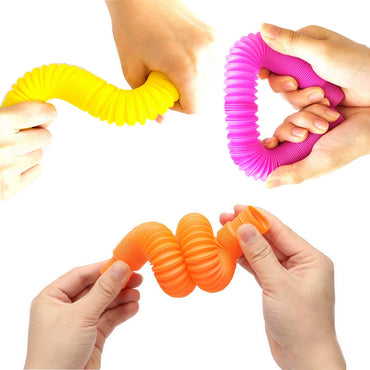Sensory Toys
Sensory toys or Fidget toys are toys that are designed to stimulate the senses and provide sensory input to the user. These toys are often used to support the development and regulation of sensory processing skills. Sensory toys can be used by individuals of all ages and abilities, but are especially beneficial for individuals with sensory processing difficulties, such as those with autism, ADHD, or sensory processing disorder.
Sensory Toys Ireland
Sensory toys come in a variety of forms and may focus on different senses, including:
-
Tactile (touch): toys that provide different textures and surfaces to touch, such as squishy balls, fidget toys, or sensory bins filled with different materials.
-
Auditory (sound): toys that produce different sounds, such as musical instruments, noise-canceling headphones, or white noise machines.
-
Visual (sight): toys that provide visual stimulation, such as light-up toys, bubble tubes, or kaleidoscopes.
-
Proprioceptive (movement and pressure): toys that provide pressure or resistance, such as weighted blankets, therapy balls, or compression vests.
Sensory toys can be used in therapy sessions or at home to help promote self-regulation, reduce anxiety, and improve attention and focus.
FAQs
What are considered sensory toys?
Sensory toys come in a wide variety of forms and can focus on different senses, including tactile, auditory, visual, and proprioceptive. Sensory toys can be used to promote self-regulation, reduce anxiety, and improve attention and focus in individuals with sensory processing difficulties. It's important to choose sensory toys that are appropriate for the individual's age, abilities, and needs.
Are sensory toys only for autism?
No, sensory toys are not only for individuals with autism. While sensory toys can be particularly helpful for individuals with sensory processing difficulties such as those with autism, ADHD, or sensory processing disorder, they can be used by anyone to promote sensory exploration and regulation. They can be beneficial for individuals of all ages and abilities, including those without sensory processing difficulties, as they can help reduce stress and promote relaxation. Sensory toys can also be used in various settings, including at home, in schools, and in therapy sessions. They can be used to facilitate social interaction and communication, promote motor skills development, and increase focus and attention.
Is sensory play good for autism?
Yes, sensory play can be highly beneficial for individuals with autism. Autism is a neurodevelopmental disorder that affects social communication, behavior, and sensory processing. Many individuals with autism have difficulties with sensory processing, meaning they may overreact or underreact to sensory stimuli. Sensory play involves exploring and manipulating different materials and textures to promote engagement and regulation of the senses. Sensory play can help individuals with autism develop better sensory processing skills, reduce anxiety, and improve focus and attention. Here are some of the ways that sensory play can be beneficial for individuals with autism: Promotes self-regulation: Sensory play can help individuals with autism learn how to regulate their sensory experiences, which can help reduce anxiety and promote relaxation. Enhances social skills: Sensory play can be used to facilitate social interaction and communication, which can help individuals with autism develop social skills and build relationships with others. Develops motor skills: Sensory play can involve movement and manipulation of different materials, which can help develop fine and gross motor skills. Improves attention and focus: Sensory play can be highly engaging and stimulating, which can help improve attention and focus in individuals with autism. It's important to note that sensory play should be tailored to the individual's specific needs and abilities. A qualified therapist or healthcare professional can provide guidance on selecting appropriate sensory materials and activities for individuals with autism.
What is the purpose of sensory toys for ADHD?
The purpose of sensory toys for ADHD is to provide a range of sensory inputs that can help individuals with ADHD regulate their sensory experiences and improve focus and attention. ADHD is a neurodevelopmental disorder that affects attention, behavior, and impulse control. Many individuals with ADHD also have difficulties with sensory processing, meaning they may have trouble filtering out distractions and maintaining attention. Sensory toys provide a variety of sensory inputs, such as tactile, auditory, visual, and proprioceptive, which can help individuals with ADHD regulate their sensory experiences and improve focus and attention. Sensory toys can be highly engaging and stimulating, which can help reduce boredom and restlessness.
Are sensory toys good for all children?
Yes, sensory toys can be good for all children, regardless of whether or not they have a specific sensory processing difficulty. Sensory toys provide a range of sensory inputs, such as tactile, auditory, visual, and proprioceptive, which can promote engagement and regulation of the senses. Sensory play can also help develop fine and gross motor skills, promote social interaction and communication, and reduce stress and anxiety. Sensory toys can be especially beneficial for children who may be experiencing stress or anxiety, as they provide a calming and soothing outlet. Sensory play can help children develop better self-regulation skills, which can be useful in a variety of settings, including school and home. It's important to note that while sensory toys can be beneficial for all children, some children may be more sensitive to certain types of sensory input than others.


